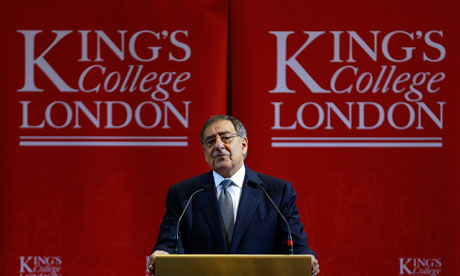
From Leon Panetta, Department of Defense: Since 1949, NATO has been an unprecedented force for global security and prosperity, developing into the most effective and capable and enduring multilateral security alliance the world has ever seen.
Now more than 60 years old, more than two decades after the fall of the Berlin Wall, and more than a decade after 9/11, NATO remains the bedrock of America’s global network of alliances and partnerships. But today, after over 11 years of war, I believe we are at another turning point in the history of the transatlantic alliance.
We are facing some very tough questions. What is the future of the NATO alliance? Will NATO retreat from its responsibilities out of complacency or a different set of priorities in the face of growing budget constraints? Or will NATO have the creativity, the innovation, the commitment to develop and share the capabilities it must have in order to meet future security threats? . . .
[T]he United States and Europe now are facing the reality of budget constraints together. And in an era of constrained resources, we need to make our alliances count. The bottom line is that no one nation can confront the threats that I’ve described alone. That’s the reality. But that also means no one nation can shoulder the burden for our collective security alone.
That’s why I have made building stronger alliances and partnerships my top priority as secretary of defense, including NATO. It’s also why I believe we have a window of opportunity to fundamentally reorient the transatlantic alliance to tackle the most pressing challenges that we are facing in the 21st century, and yet to be able to meet our fiscal responsibilities at the same time. I do not believe we have to choose between fiscal responsibility and our responsibility to national security.
Let me describe three areas of focus that must be made if we are to bolster NATO and to confront the threats of the future.
First, we must develop innovative alliance cooperation. It will be essential to finally move away from the Cold War approaches to meeting alliance security commitments and instead embrace cost-effective, innovative forms of defense cooperation that are tailored to meeting the most relevant security challenges that we face today and tomorrow.
NATO can no longer be an alliance focused on a single type of mission, whether deterring the aggression of another superpower or conducting stability operations in Afghanistan. To be prepared to quickly respond to a wide range of threats in an era of fiscal constraint, we have got to build an innovative, flexible, and rotational model for forward-developed presence and training. . . .
Second, we’ve got to invest in new frontiers. A second key line of effort is to make an investment in critical new alliance capabilities that will help maintain our decisive military edge into the future. For example, one of the key security challenges that I’ve focused on during my tenure as director of the CIA and now as secretary of defense is the threat from cyber-intrusions and cyber-attacks. . . .
Beyond cyber, we must also invest in other capabilities — new intelligence surveillance, reconnaissance platforms, next-generation platforms, such as the Joint Strike Fighter, and special operations forces. As we attempt to acquire these capabilities amid severe budget challenges, it is imperative that we do so in a strategic and coordinated way. NATO’s smart defense means that not every nation needs to duplicate capabilities. Time has come when nations can share critical capabilities, critical capacities that enhance NATO’s ability to be able to respond to common threats.
And, finally, we have to build other regional partnerships. The third pillar for building the transatlantic alliance of the 21st century must be a determined and proactive effort to build strong partnerships with nations and security organizations in other regions of the world.
The purpose of this partnership approach is not to build a global NATO, but rather to help other regions do more to provide for their own security and in the process become more capable every day of partnering with us to be more effectively equipped to meet global challenges.
We see this every day in Afghanistan, where more than 20 non-NATO countries — Australia, Jordan, others — work alongside NATO countries in ISAF. And we saw the benefits of this approach in our Libya approach, as well, where the Arab League and the Gulf Cooperation Council partnered with Europe and North America under a NATO umbrella to protect the Libyan people. The presence of these regional partners has added credibility and capability to the alliance effort and laid the groundwork for continued cooperation in the future. . . .
[I]n the NATO alliance, the world has a model for how nations can come together to advance global peace and global security. After more than 60 years, it remains the one true military alliance capable of acting decisively to help achieve those goals. But to fulfill those goals in the future, the transatlantic alliance must be strong and bold enough to change.
The question now before the transatlantic alliance is whether our nations can build stronger defense partnerships and modernize our military capabilities in the face of significant fiscal uncertainty. Our response to that question must be unequivocal. It must be clear. It must be defiant, in the spirit of Roosevelt and Churchill at Casablanca, that while we may face a great many challenges, we face none that our combined strength cannot overcome.
Excerpts from remarks by Secretary of Defense Leon Panetta at King’s College, London. (photo: Andrew Winning/Reuters)
Image: reuters%201%2019%2013%20Panetta.jpg
